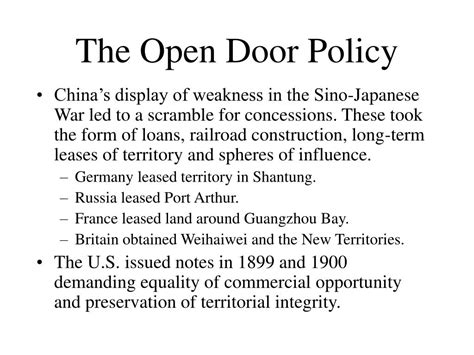Why Did The United States Establish The Open Door Policy

The Open Door Policy, established by the United States in 1899, was a significant diplomatic initiative aimed at promoting American economic interests in China while maintaining the country's territorial integrity. The policy was introduced by Secretary of State John Hay, who recognized the importance of China as a market for American goods and a potential area of influence for the United States. At the time, China was facing intense pressure from European powers, including Britain, France, Germany, and Russia, which were seeking to carve out spheres of influence within the country.
The United States, having recently emerged as a global power following the Spanish-American War, sought to establish itself as a major player in East Asian affairs. The Open Door Policy was designed to prevent the division of China into separate spheres of influence, which would have limited American access to the Chinese market. By promoting the principle of equal trade opportunities for all nations, the United States hoped to maintain China's territorial integrity and ensure that American businesses could compete on a level playing field.
Key Points
- The Open Door Policy was introduced by Secretary of State John Hay in 1899 to promote American economic interests in China.
- The policy aimed to prevent the division of China into separate spheres of influence and maintain the country's territorial integrity.
- The United States sought to establish itself as a major player in East Asian affairs and ensure equal trade opportunities for all nations.
- The policy was a response to the intense pressure from European powers, including Britain, France, Germany, and Russia, which were seeking to carve out spheres of influence in China.
- The Open Door Policy had significant implications for the development of international relations in East Asia and the global balance of power.
Historical Context and Motivations

The Open Door Policy was motivated by a combination of economic, strategic, and ideological factors. The United States had long been interested in expanding its trade with China, which was seen as a vast and potentially lucrative market. American businesses, including manufacturers and traders, were eager to tap into this market and establish themselves as major players in the region. At the same time, the United States was concerned about the potential for European powers to dominate China and exclude American interests.
The policy was also driven by a sense of ideological mission, as the United States sought to promote its values of free trade, democracy, and self-determination in East Asia. The Open Door Policy was seen as a way to counter the influence of European imperialism and promote a more equitable and peaceful international order. By advocating for equal trade opportunities and the maintenance of China's territorial integrity, the United States hoped to create a more stable and secure environment for American businesses to operate in.
Economic Interests and the Open Door Policy
The economic interests of the United States played a significant role in the development of the Open Door Policy. American businesses were eager to expand their trade with China, which was seen as a major market for American goods, including textiles, machinery, and agricultural products. The United States was also interested in investing in China’s infrastructure, including railways, ports, and telecommunications systems. By promoting the principle of equal trade opportunities, the United States hoped to create a level playing field for American businesses to compete with their European rivals.
| Year | US Trade with China (millions of dollars) |
|---|---|
| 1898 | 23.4 |
| 1899 | 26.5 |
| 1900 | 31.2 |
| 1901 | 35.6 |

Impact and Legacy of the Open Door Policy

The Open Door Policy had significant implications for the development of international relations in East Asia and the global balance of power. The policy helped to prevent the division of China into separate spheres of influence, which would have limited American access to the Chinese market. By promoting the principle of equal trade opportunities, the United States was able to establish itself as a major player in East Asian affairs and challenge the dominance of European powers.
The Open Door Policy also had significant economic implications, as American businesses were able to expand their trade with China and invest in the country's infrastructure. The policy helped to promote economic growth and development in China, which became a major market for American goods and a key player in regional trade. However, the policy also had its limitations, as it failed to prevent the eventual collapse of the Chinese imperial system and the rise of Japanese expansionism in East Asia.
Limitations and Criticisms of the Open Door Policy
Despite its significance, the Open Door Policy has been subject to various criticisms and limitations. Some historians have argued that the policy was overly idealistic and failed to take into account the complexities of Chinese politics and the interests of other powers in the region. Others have criticized the policy for being overly focused on American economic interests, which were seen as being in conflict with the needs and interests of the Chinese people.
In addition, the policy has been criticized for its lack of effectiveness in preventing the eventual collapse of the Chinese imperial system and the rise of Japanese expansionism in East Asia. The policy's emphasis on equal trade opportunities and the maintenance of China's territorial integrity was seen as being at odds with the realities of power politics in the region, where military strength and strategic alliances were often more important than diplomatic declarations.
What were the main goals of the Open Door Policy?
+The main goals of the Open Door Policy were to promote American economic interests in China, prevent the division of China into separate spheres of influence, and maintain the country's territorial integrity.
What were the economic implications of the Open Door Policy?
+The Open Door Policy had significant economic implications, as American businesses were able to expand their trade with China and invest in the country's infrastructure. The policy helped to promote economic growth and development in China, which became a major market for American goods and a key player in regional trade.
What were the limitations and criticisms of the Open Door Policy?
+The Open Door Policy has been subject to various criticisms and limitations, including its overly idealistic nature, its focus on American economic interests, and its lack of effectiveness in preventing the eventual collapse of the Chinese imperial system and the rise of Japanese expansionism in East Asia.
Meta Description: The Open Door Policy, introduced by the United States in 1899, aimed to promote American economic interests in China while maintaining the country’s territorial integrity. Learn more about the policy’s historical context, motivations, and implications. (140-155 characters)


